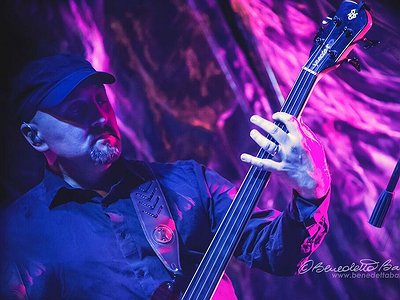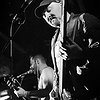Part 3
How is playing live and writing music in the studio connected? What do you achieve and draw from each experience personally? How do you see the relationship between improvisation and composition in this regard?
For any musician, playing live is simply the best way to develop not only your own sound but the music you play as well. Nothing tests material better than playing it to a live audience outside the rehearsal room, in real time.
I frequently find myself in situations where improvisation is called for, with O.R.k. we naturally found we were all comfortable improvising at certain moments without any discussion. Llikewise Twinscapes, the chemistry was just there, so the live gigs have always featured an expansion to what we may have presented on the albums. Ex-Wise Heads had some real “free”moments as well, as Geoff Leigh was always very spontaneous.
It’s always quite satisfying to see how a song or composition can develop or change from night to night, sometimes growing different parts or loosing others. Albums are really only snapshots, while live gigs are like the movie, or perhaps the series!
How do you see the relationship between the 'sound' aspects of music and the 'composition' aspects? How do you work with sound and timbre to meet certain production ideas and in which way can certain sounds already take on compositional qualities?
Sound, as in the sonic elements and the balance and contrast between them can be absolutely crucial. I do actually think some sounds are almost archetypal and can tap into the subconscious, triggering emotional reactions and perhaps buried thoughts and memories.
I generally spend a lot of time exploring sounds and sound design, also, most of the things I record and mix will have elements of buried “found sound” to add character and depth, sometimes these won’t even be readily noticeable, but it’s like adding a layer waiting to be discovered on subsequent listens.
Psychoacoustics is an endlessly fascinating subject, and doing things like making a drum sound out of samples of say, footsteps, or percussive sounds from sharp intakes of breath can sometimes elicit a hidden emotional trigger or at least create a sense of ambiguity in music.
Our sense of hearing shares intriguing connections to other senses. From your experience, what are some of the most inspiring overlaps between different senses - and what do they tell us about the way our senses work? What happens to sound at its outermost borders?
The physical vibrations coming off a great big bass speaker are something I’ll probably always love! There are certain frequencies you feel more than you actually hear, and they are just as important to the whole.
Being at a festival where you’re hearing a huge PA from a long way away, and the way the wind can change the sound into something quite strange by the time it reaches you. are really fascinating. Uusually you’re still able to understand though, which tells you how clever your brain really is. It quite fascinating how certain sounds can seem different to what they actually are on listening to them repeatedly too.
Art can be a purpose in its own right, but it can also directly feed back into everyday life, take on a social and political role and lead to more engagement. Can you describe your approach to art and being an artist?
Whether I am on my own or with others, my approach is a mixture of curiosity, expression and a desire to expand my comfort zone. I don’t usually get involved in music which might be considered political, although O.R.k.’s cover of Bowie’s “I am Afraid of Americans” was a conscious expression of our collective disgust at the Presidency of Donald Trump.
The world faces alarming, urgent and enormous problems which require cooperation between everyone on the planet. That culture itself seems to be under threat and also that the world seems to be becoming less tolerant, more divisive, more insular and less able to find those common bonds between people I find extremely disturbing.
Music is one of the strongest common bonds between humans, I can only think that my life in music (I hesitate to use the word “career”, since I have never planned anything and have rather followed my nose) has given me the most marvelous connections, opportunities and experiences and convinced me that open mindedness, tolerance and respect are among the most important attributes you can possess.
It would be a great start if our leaders felt the same way.
It is remarkable, in a way, that we have arrived in the 21st century with the basic concept of music still intact. Do you have a vision of music, an idea of what music could be beyond its current form?
Music follows the natural laws of the universe, even when it’s discordant or possibly misunderstood, and it connects cultures and is infinitely variable. It’s also mysterious, frequently defies analysis and it expresses things where words or descriptions are inadequate. We all need it, and it touches all of us at times. Whatever styles or forms it will take in the future, nothing will change our need for it.







